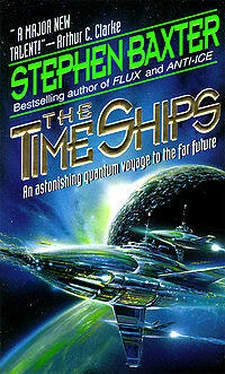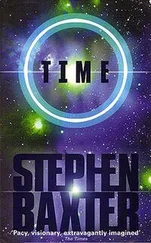My head ached pretty comprehensively and my body felt as if it had been through a grueling boxing-bout. But, paradoxically, my mood seemed a little improved. The death of Moses — was still there in my mind — a huge event, which I knew I must confront, in time — but after those moments of blessed unconsciousness I was able to look away from it, as one might turn away from the blinding light of the sun, and consider other things.
That dim, pearly mixture of day and night still suffused the interior of the car. It was quite remarkably cold; I felt myself shiver, and my breath fogged before my face. Nebogipfel sat in the pilot’s bucket seat, his back turned to me. His white fingers probed at the instruments in the rudimentary dash-board, and he traced the wires which dangled from the steering column.
I got to my feet. The car’s swaying, together with the battering I had endured in 1938, left me uncertain on my feet; to steady myself I had to cling to the cabin’s ribbed framework, and found the metal ice-cold under my bare hands. The soft item which had been cushioning my head, I found, was the Morlock’s blazer. I folded it up and placed it on a bench. I also saw, dropped on the floor, the heavy wrench which Moses had used to open the Plattnerite flasks. I picked it up with my fingertips; it was splashed with blood.
I still wore my heavy epaulets; disgusted by these bits of armor, I ripped them from my clothes and dropped them with a clatter.
At the noise, Nebogipfel glanced towards me, and I saw that his blue goggles were cracked in two, and that one huge eye was a mess of blood and broken flesh. “Prepare yourself,” he said thickly.
“What for? I—”
And the cabin was plunged into darkness.
I stumbled backwards, almost falling again. An intense cold sucked the remaining warmth out of the cabin air, and from my blood; and my head pounded anew. I wrapped my arms around my torso. “What has happened to the daylight?”
The voice of the Morlock seemed almost harsh in that swaying blackness. “It will last only a few seconds. We must endure…”
And, as quickly as it had come, the blackness receded, and the gray light seeped into the cabin once more. Some of the edge of that immense cold was blunted, but still I shivered violently. I knelt on the floor beside Nebogipfel’s seat. “What is happening? What was that?”
“Ice,” he said. “We are traveling through an Age of Periodic Glaciation; ice-sheets and glaciers are sweeping down from the north and covering the land — overwhelming us in the process — and then melting away. At times, I would hazard, there is as much as a hundred feet of ice above us.”
I peered through the slit-windows in the car’s front panel. I saw a Thames valley made over into a bleak tundra inhabited only by tough grass, defiant blazes of purple heather, and sparse trees; these latter shivered through their annual cycles too fast for me to follow, but they looked to me like the hardier varieties: oak, willow, poplar, elm, hawthorn. There was no sign of London: I could make out not even the ghosts of evanescent buildings, and there was no evidence of man in all that gray landscape, nor indeed of any animal life. Even the shape of the landscape, the hilts and valleys, seemed unfamiliar to me, as it was remade over and again by the glaciers.
And now — I saw it approach in a brief flood of white brilliance, before it overwhelmed us — the great Ice came again. In darkness, I cursed, and dug my hands into my arm-pits; my fingers and toes were numb, and I began to fear frostbite. When the glaciers receded once more, they left a landscape inhabited by much the same variety of hardy plants, as far as I could see, but with its contours adjusted: evidently the intervals of Ice were remaking the landscape, though I could not tell if we were proceeding into future or past. As I watched, boulders taller than men seemed to migrate across the landscape, taking slow slithers or rolls; this was clearly some odd effect of the erosion of the land.
“For how long was I unconscious?”
“Not long. Perhaps thirty minutes.”
“And is the Time-Car taking us into the future?”
“We are penetrating the past,” the Morlock said. He turned to face me, and I saw how his graceful movements had been reduced to stiff jerks by the fresh pummeling I had inflicted on him. “I am confident of it. I caught a few glimpses of the recession of London — its withering, back to its historical origins… From the intervals between Glaciations, I should say we are traveling at some tens of thousands of years every minute.”
“Perhaps we should work out how we might stop this car’s headlong drive into time. If we find an equable age—”
“I do not drink we have any way of terminating the flight of the car.”
“What?”
The Morlock spread his hands — I saw how the hair on the back of them was sprinkled with a light frost — and then we were plunged once more into a darkened sepulcher of Ice, and his voice floated out of the obscurity. “This is a crude, unfinished test vehicle, remember. Many of the controls and indicators are disconnected; those that do have connections largely appear nonfunctional. Even if we knew how to modify the workings with out wrecking the vehicle, I can see no way for us to get out of the cabin to reach the inner mechanism.”
We emerged from the Ice into that reshaped tundra once more. Nebogipfel watched the landscape with some fascination. “Think of it: the fjords of Scandinavia are not yet cut, and the lakes of Europe and North America — deposited by melting ice — are phantasms of the future.
“Already, we have passed beyond the dawn of human history. In Africa we might find races of Australopithecines some of them clumsy, some gracile, some carnivorous, but all with a bipedal gait and ape-like features: a small brain-case and large jaws and teeth…”
A great, cold loneliness descended on me. I had been lost in time before, but never, I thought, had I suffered quite this intensity of isolation! Was it true — could it be true — that Nebogipfel and I, in our damaged Time-Car, represented the only candle-flames of intelligence on the whole of the planet?
“So we are out of control,” I said. “We may not stop until we reach the beginning of time…”
“I doubt it will come to that,” Nebogipfel said. “The Plattnerite must have some finite capacity. It cannot propel us deeper into time, forever; it must exhaust itself: We must pray that it does so before we pass through the Ordovician and Cambrian time-layers — before we reach an Age in which there is no oxygen to sustain us.”
“That’s a cheerful prospect,” I said. “And things may become worse still, I suppose.”
“How?”
I got my stiff legs out from under me and sat on the cold, ribbed metal floor. “We have no provisions, of any kind. No water, no food. And we’re both injured. We don’t even have warm clothing! How long can we survive, in this freezing time-ark? A few days? Less?”
Nebogipfel did not reply.
I am not a man to submit easily to Fate, and I invested some energy in studying Nebogipfel’s controls and wires. I soon learned he was right — there was no way I could find to build this tangle of components into a dirigible vehicle — and my energy, sapped as it was, was soon spent: I reverted to a sort of dull apathy.
We passed through one more brief, brutal Glaciation; and then we entered a long, bleak winter. The seasons still brought snow and ice flickering across the land, but the Age of Permanent Ice lay in the future now. I saw little change in the nature of the landscape, millennium on millennium: perhaps there was a slow enrichment of the texture of the blur of greenery that coated the hills. An immense skull — it reminded me of an elephant’s — appeared on the ground not far from the Time-Car, bleached, bare and crumbled. It persisted long enough for me to make out its contours, a second or so, before it vanished as fast as it had appeared.
Читать дальше
Конец ознакомительного отрывка
Купить книгу









